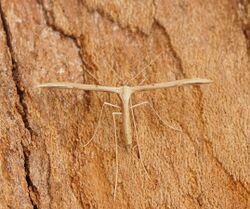Biology:Emmelina argoteles
From HandWiki
Short description: Species of plume moth
| Emmelina argoteles | |
|---|---|

| |
| Scientific classification | |
| Domain: | Eukaryota |
| Kingdom: | Animalia |
| Phylum: | Arthropoda |
| Class: | Insecta |
| Order: | Lepidoptera |
| Family: | Pterophoridae |
| Genus: | Emmelina |
| Species: | E. argoteles
|
| Binomial name | |
| Emmelina argoteles (Meyrick, 1922)
| |
| Synonyms | |
|
List
| |
Emmelina argoteles (also known as the reed-bed plume) is a moth of the family Pterophoridae found in Asia and Europe. It was first described by Edward Meyrick in 1922.[1]
Description
The wingspan is about 17 mm.[2]
The larvae feed on hedge bindweed (Calystegia sepium), Calystegia sodanella, Japanese bindweed (Calystegia japonica), bindweed (Convolvulus species) and sweet potato (Ipomoea batatas).[3]
Distribution
It is found in southern and central Europe, through Russia to India , China , Korea and Japan . It was discovered at Wicken Fen, Great Britain in 2005.[4][5]
References
- ↑ "Emmelina argoteles (Meyrick, 1922)". https://fauna-eu.org/cdm_dataportal/taxon/0f6c0282-6bf0-4cb8-9b0b-0b81d2ae7817. Retrieved 25 August 2020.
- ↑ Kim, Sora; Byun, Bong-Kyu; Park, Kyu-Tek; Lee, Seunghwan (2010-05-24). "Taxonomic study of the tribe Oidaematophorini (Lepidoptera: Pterophoridae) from Korea, with descriptions of the two new species". Journal of Natural History 44 (23–24): 1377–1399. doi:10.1080/00222931003679006.
- ↑ Ellis, W N. "Emmelina argoteles (Meyrick, 1922) reed-bed plume". https://bladmineerders.nl/parasites/animalia/arthropoda/insecta/lepidoptera/ditrysia/apoditrysia/pterophoroidea/pterophoridae/pterophorinae/emmelina/emmelina-argoteles/. Retrieved 25 August 2020.
- ↑ Higgott, Jeff B. (2006). "Emmelina argoteles Meyrick, (1922) Lep: Pterophoridae - A newly recognised British plume moth.". Entomologist's Record and Journal of Variation 118: 195–197.
- ↑ Ringwood, Z; Roscoe, A; Higgott, J. (2009). "A New British Plume Moth (Emmelina argoteles) discovered at Wicken Fen in Cambridgeshire: How you can help to determine its British distribution.". Nature in Cambridgeshire 50: 79–84.
External links
Wikidata ☰ Q5373415 entry
 |

